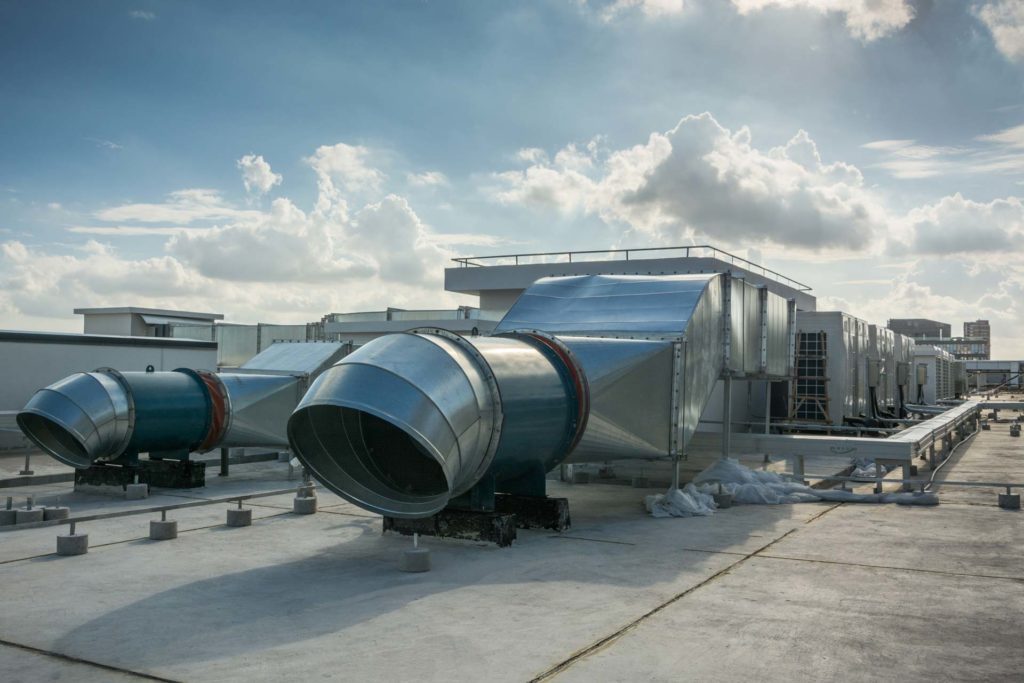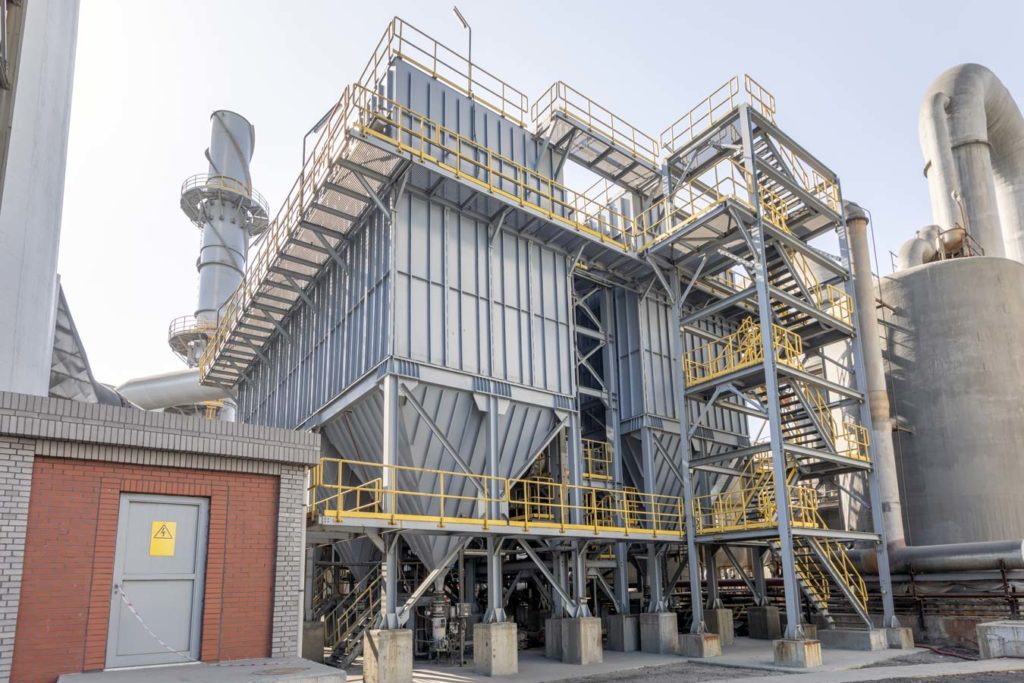originally published January 2022 – updated August 2025
Industrial dust collection is a critical investment in worker safety, regulatory compliance, and equipment longevity. Whether you’re producing cement, processing chemicals, or running a food plant, airborne dust and particulates can quickly become a significant hazard.
The reality is that not every industry faces the same level of risk. Some sectors need far more robust dust collection systems than others due to the volume of fine particles they generate.
In this post, we’re breaking down the top 5 industries that rely on industrial dust collection systems and why these solutions matter.
1. Asphalt & Cement
Asphalt plants and cement facilities face some of the toughest dust control challenges in the industry. Fine silica and aggregate dust can quickly:
- Create unsafe working conditions
- Damage expensive equipment
- Trigger costly OSHA or EPA violations
Why dust collection is critical
A properly designed dust collection system captures particulates at the source and prevents them from becoming airborne. This helps facilities:
- Stay compliant with air quality and workplace safety regulations
- Protect worker health by minimizing silica dust exposure
- Reduce maintenance costs by preventing buildup on mixers, conveyors, and kilns
- Keep production on schedule by reducing downtime caused by equipment failures
When dust collection systems are appropriately sized and maintained, they help asphalt and cement facilities protect their workforce, extend equipment life, and maintain a competitive edge.
Where these systems are used
Dust collection is essential for maintaining safe, efficient operations in:
- Road paving operations
- Ready-mix concrete plants
- Cement kilns
- Aggregate handling facilities
Each of these environments generates high volumes of abrasive dust that can overwhelm undersized or poorly maintained systems.
2. Mining & Metals
Metal fabrication shops, foundries, and mining operations face serious dust hazards every day. Fine metallic and mineral particulates can:
- Harm workers’ health and lead to chronic respiratory illnesses
- Compromise electrical systems by causing shorts and fires
- Damage sensitive equipment and accelerate wear on moving parts
- Contaminate finished products, leading to defects and costly rework
Why dust collection is critical
A properly designed dust collection system captures hazardous particulates at the source and prevents them from accumulating in work areas. This helps facilities:
- Meet OSHA exposure limits and NFPA fire safety standards
- Protect employees from harmful welding fumes, silica dust, and other airborne metals
- Reduce equipment failures by preventing buildup in motors, bearings, and electrical systems
- Maintain consistent product quality and reduce costly rework
For mining and metal processing facilities, effective dust control plays a vital part in keeping production moving and protecting your bottom line.
Where these systems are used
Dust collection is essential for controlling particulate emissions in:
- Metal fabrication and welding shops
- Foundries and smelting operations
- Mining and mineral processing plants
- Grinding, cutting, and polishing stations
These environments push dust collection equipment to its limits, making it critical to choose durable systems designed for heavy particulate loads.
3. Chemical Processing
Chemical manufacturing facilities — including pharmaceutical plants — handle powders and raw materials that create serious dust hazards. Fine particulates from these processes can quickly:
- Contaminate products and compromise quality control
- Expose workers to harmful chemicals and allergens
- Increase the risk of fires or explosions in environments with combustible dust
- Damage sensitive equipment and disrupt production schedules
Why dust collection is critical
A properly designed dust collection system keeps airborne particulates contained and protects the integrity of your products, people, and processes. These systems help facilities:
- Meet strict FDA and OSHA requirements for air quality and contamination control
- Safeguard employees from exposure to hazardous chemicals and pharmaceutical powders
- Maintain consistent product quality by reducing airborne contamination
- Lower the risk of fires and explosions by capturing combustible dust at the source
For chemical processors and pharmaceutical manufacturers, effective dust collection is essential to maintaining safe operations and avoiding costly production delays.
Where these systems are used
Dust collection systems are a key part of safe operations in:
- Pharmaceutical manufacturing and packaging facilities
- Chemical blending and mixing operations
- Paints, coatings, and plastics production plants
- Industrial facilities handling fine or combustible powders
These environments often require explosion‑proof or specialty dust collectors designed to meet strict safety standards.
4. Food Processing
Food processing facilities must keep their production environments clean and contamination‑free at all times. Airborne dust in these settings can quickly:
- Contaminate food products and cause costly recalls
- Expose employees to allergens and other airborne health hazards
- Damage sensitive production equipment and reduce its lifespan
- Increase the risk of fires or explosions in areas with combustible dust, such as flour or sugar
Why dust collection is critical
A properly engineered dust collection system captures airborne particulates at the source and prevents them from contaminating production lines. These systems help facilities:
- Meet strict FDA, USDA, and OSHA requirements for cleanliness and air quality
- Protect employees from airborne allergens and respiratory hazards
- Prevent cross‑contamination between products
- Reduce downtime and extend the life of high‑value equipment
For food processing operations, effective dust collection is a direct investment in product quality, regulatory compliance, and consumer trust.
Where these systems are used
Dust collection systems are essential in a wide range of food production settings, including:
- Baking and milling facilities handling flour, grains, and sugar
- Snack, candy, and confectionery manufacturing plants
- Dairy and powdered milk production facilities
- Packaging operations for dry and powdered food products
Each of these environments demands high‑efficiency dust collection solutions that can keep pace with strict safety and quality standards.
5. Power Generation
Power plants — including coal, biomass, and waste‑to‑energy facilities — generate enormous amounts of airborne dust during everyday operations. This dust can quickly:
- Accelerate wear and tear on boilers, turbines, and other high‑value equipment
- Increase the risk of fires or explosions from combustible particles
- Create unsafe working conditions and long‑term respiratory hazards for employees
- Lead to costly violations if particulate emissions exceed EPA or state air quality limits
Why dust collection is critical
A properly designed dust collection system captures airborne particulates at their source, preventing them from accumulating in sensitive areas. This helps power generation facilities:
- Stay compliant with EPA emissions standards and local regulations
- Protect workers from harmful airborne particulates
- Extend the service life of boilers, turbines, and other significant assets
- Minimize unplanned outages and improve overall reliability
For power plants, effective dust collection directly supports operational efficiency and environmental compliance, both of which are essential for long‑term success.
Where these systems are used
Dust collection is a critical part of daily operations in:
- Coal‑fired and biomass power plants
- Waste‑to‑energy facilities
- Ash handling and storage areas
- Turbine and boiler maintenance shops
Each of these environments requires high‑capacity dust collection systems designed to manage extreme particulate loads and ensure consistent performance.
Ready to Strengthen Your Dust Collection Strategy?
Every industry faces unique dust control challenges, but the stakes are always the same — protect your people, stay compliant, and keep your operation running at peak performance.
At Baghouse America, we’ve spent more than 20 years helping facilities across asphalt and cement, mining and metals, chemical processing, food production, and power generation design and maintain dust collection systems that stand the test of time.
Our team understands the real‑world demands of these environments, and we know how to engineer solutions that deliver measurable results.
If you’re ready to upgrade your dust collection system or need expert guidance on the right solution for your facility, contact us today.

